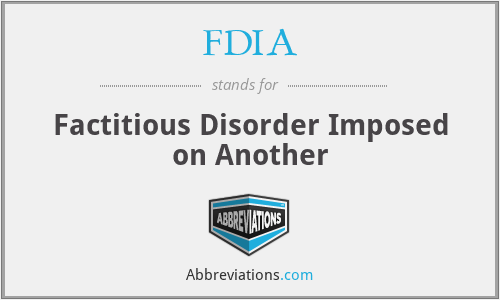What does FDIA mean in Unclassified?
This page is about the meanings of the acronym/abbreviation/shorthand FDIA in the Miscellaneous field in general and in the Unclassified terminology in particular.
Factitious Disorder Imposed on Another
Submitted by S4Bot on December 31, 2021
Translation
Find a translation for Factitious Disorder Imposed on Another in other languages:
Select another language:
- - Select -
- 简体中文 (Chinese - Simplified)
- 繁體中文 (Chinese - Traditional)
- Español (Spanish)
- Esperanto (Esperanto)
- 日本語 (Japanese)
- Português (Portuguese)
- Deutsch (German)
- العربية (Arabic)
- Français (French)
- Русский (Russian)
- ಕನ್ನಡ (Kannada)
- 한국어 (Korean)
- עברית (Hebrew)
- Gaeilge (Irish)
- Українська (Ukrainian)
- اردو (Urdu)
- Magyar (Hungarian)
- मानक हिन्दी (Hindi)
- Indonesia (Indonesian)
- Italiano (Italian)
- தமிழ் (Tamil)
- Türkçe (Turkish)
- తెలుగు (Telugu)
- ภาษาไทย (Thai)
- Tiếng Việt (Vietnamese)
- Čeština (Czech)
- Polski (Polish)
- Bahasa Indonesia (Indonesian)
- Românește (Romanian)
- Nederlands (Dutch)
- Ελληνικά (Greek)
- Latinum (Latin)
- Svenska (Swedish)
- Dansk (Danish)
- Suomi (Finnish)
- فارسی (Persian)
- ייִדיש (Yiddish)
- հայերեն (Armenian)
- Norsk (Norwegian)
- English (English)
Definition
What does FDIA mean?
- Factitious disorder imposed on another
- Factitious disorder imposed on another (FDIA), also known as fabricated or induced illness by carers (FII), and first named as Munchausen syndrome by proxy (MSbP), is a condition in which a caregiver creates the appearance of health problems in another person, typically their child. This may include injuring the child or altering test samples. The caregiver then presents the person as being sick or injured. Permanent injury or death of the victim may occur as a result of the disorder. The behaviour occurs without a specific benefit to the caregiver.The cause of FDIA is unknown. The primary motive may be to gain attention and manipulate physicians. Risk factors for FDIA include pregnancy related complications and a mother who was abused as a child or has factitious disorder imposed on self. Diagnosis is supported when removing the child from the caregiver results in improvement of symptoms or video surveillance without the knowledge of the caregiver finds concerns. Those affected by the disorder have been subjected to a form of physical abuse and medical neglect.Management of FDIA may require putting the child in foster care. It is not known how effective therapy is for FDIA; it is assumed it may work for those who admit they have a problem. The prevalence of FDIA is unknown, but it appears to be relatively rare. More than 95% of cases involve a person's mother.The prognosis for the caregiver is poor. However, there is a burgeoning literature on possible courses of therapy.The condition was first named, as "Munchausen syndrome by proxy", in 1977 by British pediatrician Roy Meadow. Some aspects of FDIA may represent criminal behavior.
Embed
Citation
Use the citation below to add this abbreviation to your bibliography:
Style:MLAChicagoAPA
"FDIA." Abbreviations.com. STANDS4 LLC, 2024. Web. 27 Apr. 2024. <https://www.abbreviations.com/term/2622425>.



Discuss this FDIA abbreviation with the community:
Report Comment
We're doing our best to make sure our content is useful, accurate and safe.
If by any chance you spot an inappropriate comment while navigating through our website please use this form to let us know, and we'll take care of it shortly.
Attachment
You need to be logged in to favorite.
Log In